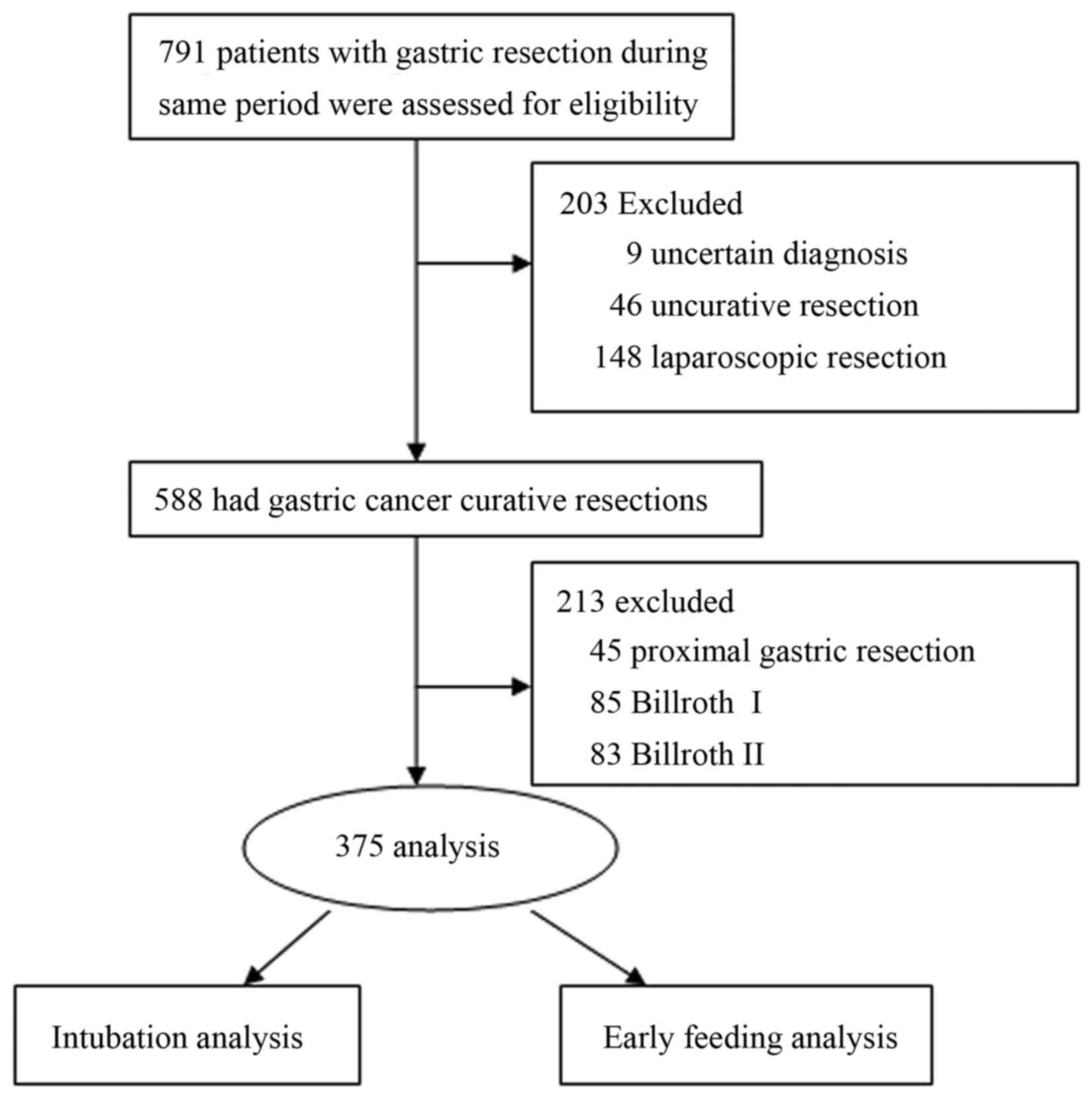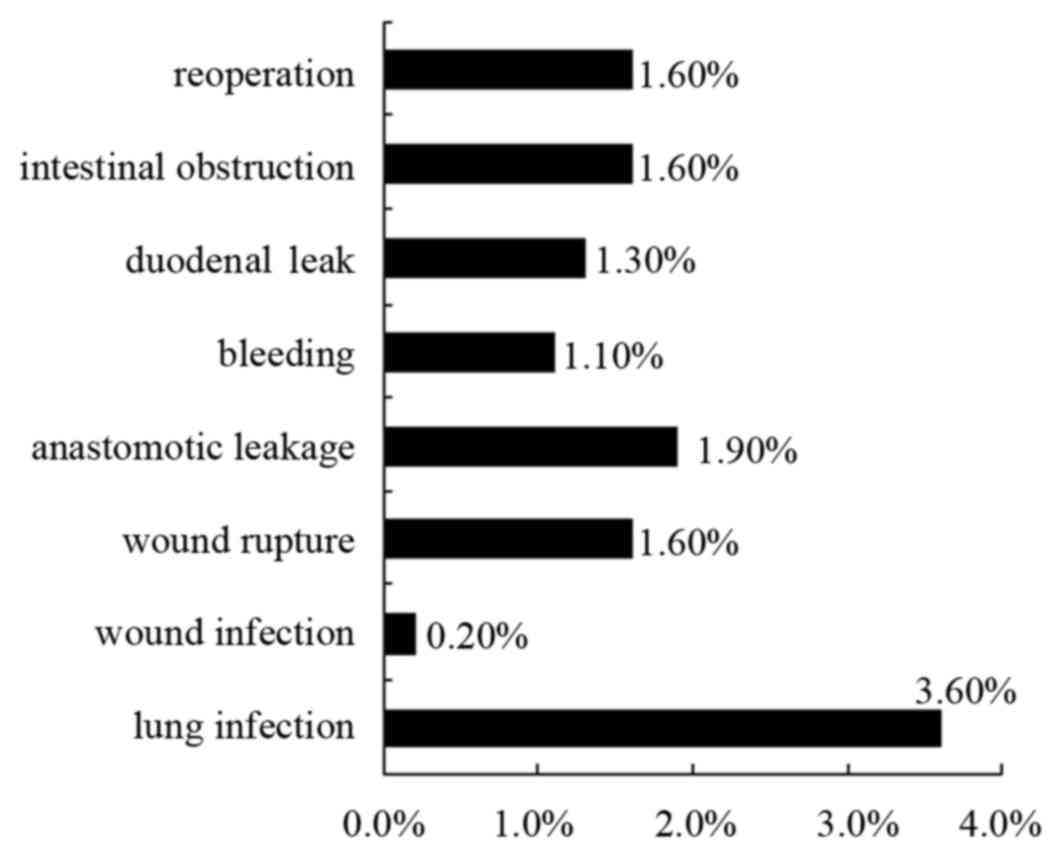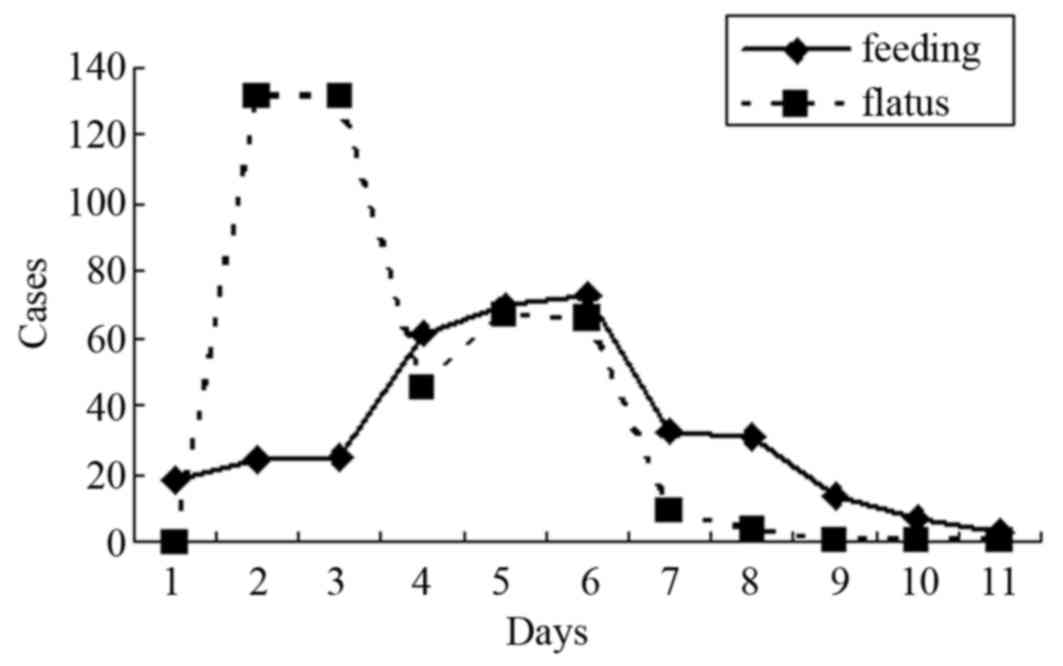|
1
|
Bardram L, Funch-Jensen P, Jensen P,
Crawford ME and Kehlet H: Recovery after laparoscopic colonic
surgery with epidural analgesia, and early oral nutrition and
mobilisation. Lancet. 345:763–764. 1995. View Article : Google Scholar : PubMed/NCBI
|
|
2
|
Nygren J, Thacker J, Carli F, Fearon KC,
Norderval S, Lobo DN, Ljungqvist O, Soop M and Ramirez J: Enhanced
Recovery After Surgery Society: Guidelines for perioperative care
in elective rectal/pelvic surgery: Enhanced Recovery After Surgery
(ERAS®) Society recommendations. Clin Nutr. 31:801–816. 2012.
View Article : Google Scholar : PubMed/NCBI
|
|
3
|
Gustafsson UO, Scott MJ, Schwenk W,
Demartines N, Roulin D, Francis N, McNaught CE, Macfie J, Liberman
AS, Soop M, et al: Guidelines for perioperative care in elective
colonic surgery: Enhanced Recovery After Surgery (ERAS (®)) Society
recommendations. World J Surg. 37:259–284. 2013. View Article : Google Scholar : PubMed/NCBI
|
|
4
|
Lassen K, Coolsen MM, Slim K, Carli F, de
Aguilar-Nascimento JE, Schäfer M, Parks RW, Fearon KC, Lobo DN,
Demartines N, et al: Guidelines for perioperative care for
pancreaticoduodenectomy: Enhanced Recovery After Surgery (ERAS®)
Society recommendations. World J Surg. 37:240–258. 2013. View Article : Google Scholar : PubMed/NCBI
|
|
5
|
Holte K, Nielsen KG, Madsen JL and Kehlet
H: Physiologic effects of bowel preparation. Dis Colon Rectum.
47:1397–1402. 2004. View Article : Google Scholar : PubMed/NCBI
|
|
6
|
Jung B, Lannerstad O, Påhlman L, Arodell
M, Unosson M and Nilsson E: Preoperative mechanical preparation of
the colon: The patient's experience. BMC Surg. 7:52007. View Article : Google Scholar : PubMed/NCBI
|
|
7
|
Ljungqvist O and Søreide E: Preoperative
fasting. Br J Surg. 90:400–406. 2003. View
Article : Google Scholar : PubMed/NCBI
|
|
8
|
Li YJ, Huo TT, Xing J, An JZ, Han ZY, Liu
XN and Zhao QC: Meta-analysis of efficacy and safety of fast-track
surgery in gastrectomy for gastric cancer. World J Surg.
38:3142–3151. 2014. View Article : Google Scholar : PubMed/NCBI
|
|
9
|
Feng F, Ji G, Li JP, Li XH, Shi H, Zhao
ZW, Wu GS, Liu XN and Zhao QC: Fast-track surgery could improve
postoperative recovery in radical total gastrectomy patients. World
J Gastroenterol. 19:3642–3648. 2013. View Article : Google Scholar : PubMed/NCBI
|
|
10
|
Cheatham ML, Chapman WC, Key SP and
Sawyers JL: A meta-analysis of selective versus routine nasogastric
decompression after elective laparotomy. Ann Surg. 221:469–478.
1995. View Article : Google Scholar : PubMed/NCBI
|
|
11
|
Manning BJ, Winter DC, McGreal G, Kirwan
WO and Redmond HP: Nasogastric intubation causes gastroesophageal
reflux in patients undergoing elective laparotomy. Surgery.
130:788–791. 2001. View Article : Google Scholar : PubMed/NCBI
|
|
12
|
Fisher WE, Hodges SE, Cruz G, Artinyan A,
Silberfein EJ, Ahern CH, Jo E and Brunicardi FC: Routine
nasogastric suction may be unnecessary after a pancreatic
resection. HPB (Oxford). 13:792–796. 2011. View Article : Google Scholar : PubMed/NCBI
|
|
13
|
Roland CL, Mansour JC and Schwarz RE:
Routine nasogastric decompression is unnecessary after pancreatic
resections. Arch Surg. 147:287–289. 2012. View Article : Google Scholar : PubMed/NCBI
|
|
14
|
Gustafsson UO, Thorell A, Soop M,
Ljungqvist O and Nygren J: Haemoglobin A1c as a predictor of
postoperative hyperglycaemia and complications after major
colorectal surgery. Br J Surg. 96:1358–1364. 2009. View Article : Google Scholar : PubMed/NCBI
|
|
15
|
Hendry PO, Hausel J, Nygren J, Lassen K,
Dejong CH, Ljungqvist O and Faron KC: Enhanced Recovery After
Surgery Study Group: Determinants of outcome after colorectal
resection within an enhanced recovery programme. Br J Surg.
96:197–205. 2009. View
Article : Google Scholar : PubMed/NCBI
|
|
16
|
Nygren J, Soop M, Thorell A, Hausel J and
Ljungqvist O: ERAS Group: An enhanced-recovery protocol improves
outcome after colorectal resection already during the first year: A
single-center experience in 168 consecutive patients. Dis Colon
Rectum. 52:978–985. 2009. View Article : Google Scholar : PubMed/NCBI
|
|
17
|
Lassen K, Kjaeve J, Fetveit T, Tranø G,
Sigurdsson HK, Horn A and Revhaug A: Allowing normal food at will
after major upper gastrointestinal surgery does not increase
morbidity: A randomized multicenter trial. Ann Surg. 247:721–729.
2008. View Article : Google Scholar : PubMed/NCBI
|
|
18
|
Lewis SJ, Egger M, Sylvester PA and Thomas
S: Early enteral feeding versus ‘nil by mouth’ after
gastrointestinal surgery: Systematic review and meta-analysis of
controlled trials. BMJ. 323:773–776. 2001. View Article : Google Scholar : PubMed/NCBI
|
|
19
|
Han-Geurts IJ, Hop WC, Kok NF, Lim A,
Brouwer KJ and Jeekel J: Randomized clinical trial of the impact of
early enteral feeding on postoperative ileus and recovery. Br J
Surg. 94:555–561. 2007. View
Article : Google Scholar : PubMed/NCBI
|
|
20
|
Nelson R, Tse B and Edwards S: Systematic
review of prophylactic nasogastric decompression after abdominal
operations. Br J Surg. 92:673–680. 2005. View Article : Google Scholar : PubMed/NCBI
|
|
21
|
Rao W, Zhang X, Zhang J, Yan R, Hu Z and
Wang Q: The role of nasogastric tube in decompression after
elective colon and rectum surgery: A meta-analysis. Int J
Colorectal Dis. 26:423–429. 2011. View Article : Google Scholar : PubMed/NCBI
|
|
22
|
Mack LA, Kaklamanos IG, Livingstone AS,
Levi JU, Robinson C, Sleeman D, Franceschi D and Bathe OF: Gastric
decompression and enteral feeding through a double-lumen
gastrojejunostomy tube improves outcomes after
pancreaticoduodenectomy. Ann Surg. 240:845–851. 2004. View Article : Google Scholar : PubMed/NCBI
|
|
23
|
Chung RS: Blood flow in colonic
anastomoses. Effect of stapling and suturing. Ann Surg.
206:335–339. 1987. View Article : Google Scholar : PubMed/NCBI
|
|
24
|
Fawcett A, Shembekar M, Church JS,
Vashisht R, Springall RG and Nott DM: Smoking, hypertension and
colonic anastomotic healing; A combined clinical and
histopathological study. Gut. 38:714–718. 1996. View Article : Google Scholar : PubMed/NCBI
|
|
25
|
Markar SR, Karthikesalingam A, Vyas S,
Hashemi M and Winslet M: Hand-sewn versus stapled oesophago-gastric
anastomosis: Systematic review and meta-analysis. J Gastrointest
Surg. 15:876–884. 2011. View Article : Google Scholar : PubMed/NCBI
|
|
26
|
Martens MF and Hendriks T: Postoperative
changes in collagen synthesis in intestinal anastomoses of the rat:
Differences between small and large bowel. Gut. 32:1482–1487. 1991.
View Article : Google Scholar : PubMed/NCBI
|
|
27
|
Högström H and Haglund U: Postoperative
decrease in suture holding capacity in laparotomy wounds and
anastomoses. Acta Chir Scand. 151:533–535. 1985.PubMed/NCBI
|
|
28
|
de Waard JW, Wobbes T, de Man BM, van der
Linden CJ and Hendriks T: Post-operative levamisole may compromise
early healing of experimental intestinal anastomoses. Br J Cancer.
72:456–460. 1995. View Article : Google Scholar : PubMed/NCBI
|
|
29
|
Borgstrom S and Lundh B: Healing of
esophageal anastomosis; Animal experiments. Ann Surg. 150:142–148.
1959. View Article : Google Scholar : PubMed/NCBI
|
|
30
|
Halaszynski TM, Juda R and Silverman DG:
Optimizing postoperative outcomes with efficient preoperative
assessment and management. Crit Care Med. 32 4 Suppl:S76–S86. 2004.
View Article : Google Scholar : PubMed/NCBI
|
|
31
|
Forster AJ, Clark HD, Menard A, Dupuis N,
Chernish R, Chandok N, Khan A, Letourneau M and van Walraven C:
Effect of a nurse team coordinator on outcomes for hospitalized
medicine patients. Am J Med. 118:1148–1153. 2005. View Article : Google Scholar : PubMed/NCBI
|
|
32
|
Berberat PO, Ingold H, Gulbinas A, Kleeff
J, Müller MW, Gutt C, Weigand M, Friess H and Büchler MW: Fast
track-different implications in pancreatic surgery. J Gastrointest
Surg. 11:880–887. 2007. View Article : Google Scholar : PubMed/NCBI
|
|
33
|
White H, Sosnowski K, Tran K, Reeves A and
Jones M: A randomised controlled comparison of early post-pyloric
versus early gastric feeding to meet nutritional targets in
ventilated intensive care patients. Crit Care. 13:R1872009.
View Article : Google Scholar : PubMed/NCBI
|
|
34
|
Balzano G, Zerbi A, Braga M, Rocchetti S,
Beneduce AA and Di Carlo V: Fast-track recovery programme after
pancreatico-duodenectomy reduces delayed gastric emptying. Br J
Surg. 95:1387–1393. 2008. View
Article : Google Scholar : PubMed/NCBI
|
|
35
|
di Sebastiano P, Festa L, De Bonis A,
Ciuffreda A, Valvano MR, Andriulli A and di Mola FF: A modified
fast-track program for pancreatic surgery: A prospective
single-center experience. Langenbecks Arch Surg. 396:345–351. 2011.
View Article : Google Scholar : PubMed/NCBI
|

















